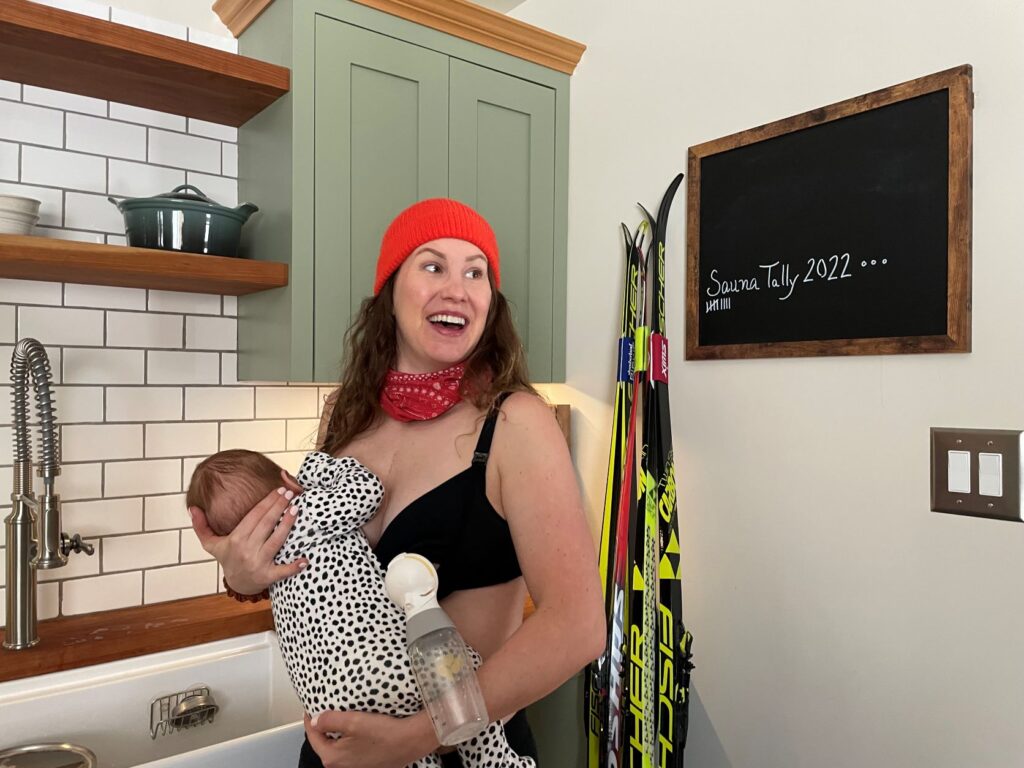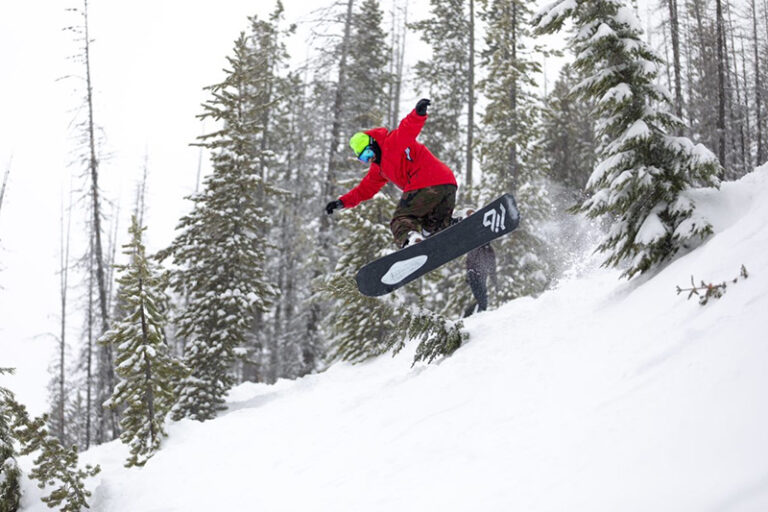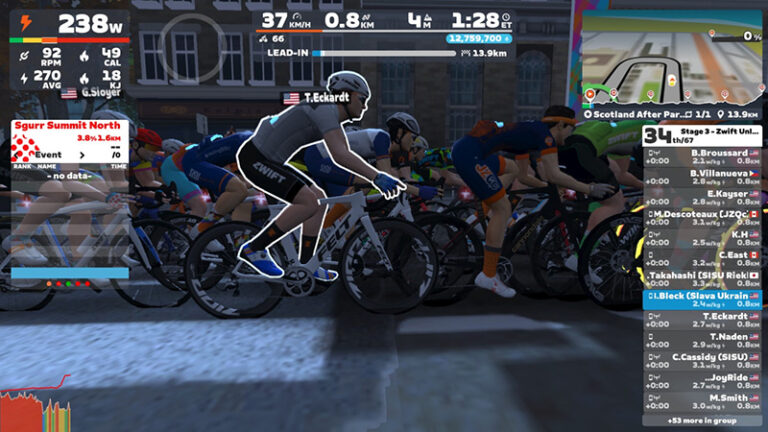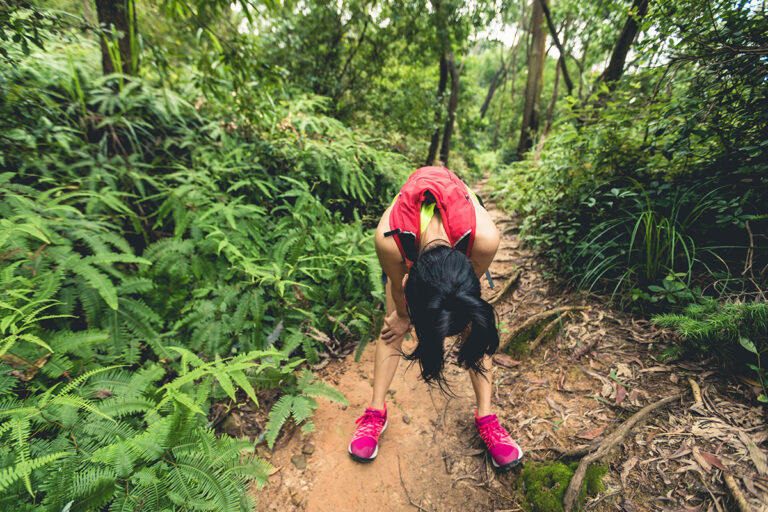Ammi Midstokke’s new “People in the Wild” column aims to observe average humans in their natural habitats, to explore and celebrate all the different reasons and ways we share a common love and stewardship of the outdoors.
Katie’s cow dog ejects from her vehicle like a wayward, spotted torpedo. Katie ignores the dog and moves around her Nissan pickup and camper with the kind of chill that makes you wonder if she’s had lorazepam for breakfast. Or she just gave up coffee to breastfeed. Either way, it is not the neurotic new mom one expects. She looks adventure appropriate: Ski pants, knit hat, buff, bright jacket, braid.
Though she never said as much, one could not help but wonder if she believed she was the exception, like every pregnant woman before her. There is a growing socio-cultural expectation that parenting success is first measured by our ability to continue being exactly as we were before, only with a 15-150 pound, perma-snacking side-kick. Katie initially accepted this challenge. We assume we’ll carry on as usual, that pregnancy will only be a difference in pant size, and that if we buy the right equipment (bouncy chair, ski trailer, breast pump), parenthood will be a matter of … logistics and tiny laundry.
What if we fold motherhood into ourselves, like cinnamon into a dough, and it forever alters our relationship to self, to the outdoors, to how we experience ourselves in the outdoors? And what if that is okay?
In winters past, Katie’s camper-cabbed truck was not to be found at trafficked trailheads. When the first snow fell in the mountains, a predictable message was sent out: “I’m breaking up with you until spring.” Katie has curated her life carefully, like an intentional museum. Each wing has a specific genre, offering a layer of sophistication and depth that only the connoisseurs of that medium might appreciate. There is the backcountry split-boarding wing. There is the corporate bulldog that closes sales deals, attends food fairs, wears designer sweaters in good taste. She’s got a wing full of literature prowess, including topping off her already thorough education with an MFA, because people ought to know what they are talking about when evoking Didion to Dostoevsky.
There is also a catch-all wing for the eclectic parts of her spirit: That time she lived on chicken breast and strawberries, got a spray tan, and danced on stage in glitter shorts for a body competition. The time she told Fischer she’d learn how to ski if they sponsored her (they did). Random ultra marathons she signs up for. Themed parties. Ministering weddings. Bee keeping. Grape growing. Her resumé shows she’s proficient in everything from French cuisine to mountain bike coaching to barbecue. (In fact, she’s a certified barbecue judge—that is a real thing and worthy of an invitation to any summer party.)
She squirms when the conversation is about her for too many sentences in a row. One gets the impression she does not do those things to talk about them, but rather to experience them. She artfully redirects in an upbeat, off-topic inquiry about anybody else. With a vast appetite for and repertoire of experience, it only seemed appropriate that Katie sample her maternal instincts by getting a puppy and then getting pregnant. As usual, nothing was accidental.
Katie launched into pregnancy with the same optimism we see on Instagram. Even as her skin turned that ashen shade of gray-green reserved for the gestating, she planned a mountaineering excursion. She spent the summer wearing bike shorts, slowing down only when her medical team threatened her with early delivery. And this she still did reluctantly, if not resentfully.
As women, there is pressure to have “belly-only” weight gain during our pregnancies, and our impending buffet-breasts are celebrated (“Oh look, you finally have boobs!”) as a reminder that our barren selves are inadequate. We should stay active and thin as per marketing by brands like GAP who use prosthetic bellies for their maternity wear, because bodies swollen with progesterone and estrogen are unsightly.
Enter baby. Or in Katie’s case, childbirth, where she lost as much blood as an extra in a Tarantino movie, replacing her green with a ghostly white for several weeks. Her postpartum exercise plan was scrapped for a goal of making it around the block without passing out. Had she not been severely anemic, she probably would have been preemptively purchasing race bibs.
What people cannot explain to the expectant mother is the visceral pull of motherhoodd—the way our bodies have a compulsion to be near our babies. The things we want postpartum are things we could never have imagined. Closing the bathroom door; eating a meal with both hands.
“I thought I would want to be out more,” says Katie. “But I don’t really feel like being four hours away from my infant and out of cell service.” That used to be considered a perfect morning.

When pried about what is hard — are you sleeping, do you miss adult conversation, is your marriage suffering, what really took you by surprise?—Katie curls up her lips and appears as if she’s looking inside her brain for a moment. “I didn’t think breastfeeding would be so hard,” she says. “These titties have never had to work a day in their life.”
We new mothers also learn that the babysitters we were going to rely on—runaway teenagers, free grandmothers, and good-willed friends—are hardly the reliable resources we had so optimistically envisioned. We realize we cannot entrust our offspring to our parents (who probably still dip tea towels in whiskey for babies to suckle) or anyone who has not had advanced infant CPR training or wears anything other than natural fibers washed in Dr. Bronner’s.
Katie’s limbs stretch gracefully above the snow as her skis slide in groomed tracks. She’s only ten minutes from her house. Her baby is with a nanny who met the said qualifications and she has come to move her body in a familiar stride. She does not look like she just grew an entire human and expelled it from her body.
Before I can tell her how good she looks, she says, “People are always commenting on ‘how good you look’ when you are postpartum. I don’t want people to acknowledge my body. I like my body. It is doing what it is supposed to be doing.”
She is acknowledging the expectation that our bodies somehow lose all evidence of pregnancy—another measure of successful womanhood. And that her value and life experience is now measured in motherhood, which she should only expose the pleasant parts of.
She exposes it all, answering the door in a bra and knee-high socks. She’s been riding her Peloton while staring at her babbling baby. She is glowing pink and happy, her eyes bright. It looks just the same as when she comes home from the backcountry.
“People say, ‘You’re so fit, you’ll get right back into it,’” she says. “But what if I don’t want to?”
What if we fold motherhood into ourselves, like cinnamon into a dough, and it forever alters our relationship to self, to the outdoors, to how we experience ourselves in the outdoors? And what if that is okay? What if, God forbid, we changed and we were fulfilled by other things too? In that version, our past is a foundation, not a time to which we are infinitely longing to return.
The gear shit-show that is Katie’s porch is evidence of her commitment to this strategy. Shoes with cleats, ski boots, dog leashes, jackets, baby carrier. When she talks to her new daughter, June, it is as if to a cohort of common ground. This new entity is no extra—rather, a fold in the dough that will be kneaded into a cohesive family.
What parenthood teaches us about love is that we feel the connection when we bear witness to the wonders of life with those we love. That is, the moments when we regard the other with the same awe and bewilderment and curiosity. When we take our children into the mountains, onto the slopes, against the wind, and share this other pulse of our beating heart. When we experience ourselves and the outdoors through their eyes.
And for a while, those eyes are two feet off the ground and they move really slow. Some changes just make us better.
Originally published as “A New Mother, an Old Identity, and Nothing Lost” in the March-April 2022 print issue.
Ammi Midstokke lives with her family in North Idaho, where she observes outdoorsy people in their natural habitat. She can be contacted at [email protected].













